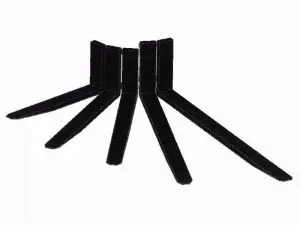Can All Forklift Forks Be Swapped Out?
By Mike Nelson, Posted in Forklift Attachments
 Forklifts are indispensable in material handling and logistics, thanks largely to their forks, which bear the brunt of the work. These attachments are a must-have in nearly every warehouse and loading dock. But are all forklift forks interchangeable? Let's explore the different types of forks, what affects their compatibility, the safety concerns involved, and how to operate them safely and efficiently.
Forklifts are indispensable in material handling and logistics, thanks largely to their forks, which bear the brunt of the work. These attachments are a must-have in nearly every warehouse and loading dock. But are all forklift forks interchangeable? Let's explore the different types of forks, what affects their compatibility, the safety concerns involved, and how to operate them safely and efficiently.
The Role of Forklift Forks
Forklift forks serve as the arms of a forklift, enabling it to lift, transport, and place heavy items across industrial and warehouse environments. Though straightforward in design, these components are crucial for ensuring smooth operations. Forks play a pivotal role in maintaining productivity and safety within any facility. They may not always get the attention they deserve, but neglecting them could lead to inefficiencies and accidents.
Varieties of Forklift Forks
Forklift forks come in several varieties, each tailored to specific tasks and weight capacities. Standard forks, the most common type, are available in various lengths and widths. Telescopic forks offer adjustable reach, making them ideal for varying load sizes. Pin-type forks are easy to attach and detach, while block forks are built for heavy-duty tasks. While swapping out forks might sound like a practical solution, there are several considerations to keep in mind. Dimensions, mounting mechanisms, and compatibility with other attachments are key factors. Forklift class, load capacity, environmental conditions, and compliance with regulations also impact whether forks can be interchanged.
While certain scenarios permit interchangeable forks, understanding their limitations is vital. For example, if two forklifts share similar specs—such as fork dimensions and attachment compatibility—interchangeability becomes easier. However, forklift class and capacity should never be compromised, and factors like extreme temperatures or corrosive substances require extra attention. Ignoring these aspects can lead to accidents and operational issues.
Safety Concerns
Safety is non-negotiable in forklift operations. Improperly swapping forks can jeopardize both the equipment and the people using it. Regulatory bodies like OSHA have established guidelines to maintain safety standards. Using incompatible forks that result in accidents or damage can lead to legal repercussions.
Best Practices for Forklift Fork Interchangeability
To ensure safe and efficient forklift operations, follow best practices. Begin by selecting forks that align with the forklift's specifications and intended use. Regular maintenance and inspections are critical for spotting potential problems early. Train operators to recognize the risks associated with interchangeable forks and how to handle them correctly.
Not all forklift forks are created equal when it comes to interchangeability. Compatibility depends on multiple factors, including safety and legal compliance. With the right selection, maintenance, and training, some forks can indeed be swapped out, improving efficiency while keeping safety top-of-mind.
Still unsure about whether your forklift forks are interchangeable? Feel free to reach out to us for guidance.
What Do Our Forklift Forks Cost?
At Koke Inc., we take pride in crafting each forklift fork according to customer specifications and unique needs. As a result, prices vary based on factors like size, features, add-ons, and order quantities. Our team is here to help you get a personalized quote. Call us at 800.535.5303 or reach out through our website for more details.
Looking to enhance your forklift operations? Contact us today for expert advice and solutions tailored to your business.
CB-2045W Leveling Wetting Agent
Silicone Leveling Agent, polydimethylsiloxane, scratch resistance, polyether-modified, leveling additive, Leveling Agent
Guangzhou Chengbian Chemical Technology Co., Ltd. , https://www.gzcbct.com